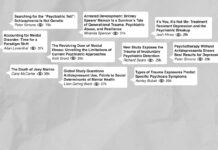Starting this fall, Mad in America Continuing Education is going to change how it presents and organizes its webinars. We are doing so for three reasons: we want to make it easier to sign up and attend the webinars; we want to reach a larger audience; and we want to make the webinars more interactive.
We started MIA Continuing Education six years ago because we wanted to provide a forum for professionals to earn continuing education credits by attending webinars that presented research and told of peer-led initiatives that challenge conventional thinking about psychiatric diagnosis and treatments. Since then, we have had 15 or so stand-alone presentations and created eight webinar courses. These courses have covered such topics as “Psychiatric Drug Withdrawal,” “Mad Studies,” “Informed Consent, “System Changes for a Green Mental Health Movement,” and “Innovative Approaches with People Who Are Suicidal.”
We’ve had more than 7,000 individuals attend these webinars. Presenters have been internationally known researchers, practitioners, and leaders in the peer community. Nearly all have been approved for continuing education credits by Commonwealth Educational Seminars. We’ve regularly received positive feedback for these courses, with those attending telling of how we are offering continuing education that isn’t offered anywhere else.
We have had our frustrations, however. We have always wanted to attract professionals and others who are new to Mad in America and the challenge to conventional thinking and practices that are presented at our courses. But that has proven difficult—the registration on our site can be a bit cumbersome and those new to us may be resistant to signing up for an eight-part course.
And so we are going to organize webinar events, starting this fall, that will be easier to register for (sign-up on Zoom), free (donations will be accepted), and often feature two or more speakers (or a panel), with more time devoted to an interaction with the audience. We will also be partnering with other organizations to present these events.
The seed for this change came this past spring, when two of MIA’s Board Members, Kermit Cole and Louisa Putnam, organized a Town Hall titled: “Are We Living in the Most Dialogical Time Ever?” The town hall featured an international panel of Open Dialogue practitioners, and it was developed in collaboration with two other organizations: Open Excellence and HOPEnDialogue, the latter an international collaboration of Open Dialogue practitioners and researchers.
The panel was hosted on Zoom. It took people about one minute to register for the event, and we were also able to easily simultaneously broadcast on our YouTube channel. Within two days of the announcement of the event, more than 500 signed up and the audience came from a number of countries. The diversity was such that, in a sense, it was a global town hall. We also found that the chat room for this event was very active, and proved to prompt a good discussion with the panelists.
That town hall dialogical series has continued during the summer.
MIA Continuing Education then used this same platform to present a webinar by Lisa Cosgrove titled “A New View of Addressing Global Mental Health.” We obtained continuing education credits for the event, and once again, within a few days of announcing it, we had several hundred sign up for it.
Our next MIA Continuing Education presentation will be on Sunday, October 4 at 2 p.m. (eastern daylight time.) It is being co-sponsored by East Side Institute in New York, and is titled: “What is mental health and what does creativity have to do with it?”
Psychotherapists Hugh Polk, MD and Rachel Mickenberg, LCSW will share the effectiveness of “social therapy” as a psychotherapy that involves working with their clients to create emotional growth and health, regardless of psychiatric diagnosis or presenting problem. In the webinar, Hugh and Rachel will introduce the ABCs of social therapy and how it is practiced in ongoing weekly therapy and community workshops of diverse groupings of people. After that, four of their clients will join them to talk about their own adventures in creating their mental health and growing emotionally through social therapy. Webinar participants will be invited to take part in the conversation.
Hugh Polk is a psychiatrist and social therapist practicing in New York City. He has been practicing for 40 years, presenting and leading workshops in the US and around the world on social therapy, the non-diagnostic, developmental therapeutic approach developed by Fred Newman in the late 1960s. He is on the faculty of the East Side Institute, an international education and research center for social therapeutics, and is a contributor at Mad in America where he co-authors the blog with Ann Green, Psych NP, “Talkin’ Therapy.” He is a former medical director of a number of community mental health centers in NYC.
Rachel Mickenberg is a social therapist who is co-founder of the High School for Public Service in Brooklyn, NY where she created a mental health program open to all students. She is also in private practice where she leads groups with pre-teens, teens and adults. She is a co-leader, with Hugh Polk, of the East Side Institute’s “Creating Our Mental Health” monthly series, a community conversation designed to explore our understanding of mental health and emotional distress.
We expect that our next focus will be creating webinars that feature panel discussions on withdrawal from psychiatric drugs. This next series will be co-sponsored by at least one other organization, and possible two others, as we seek to reach a larger audience.
We want to emphasize that all past presentations and webinars will continued to be available at our MIA Continuing Education website.
You can sign up for the October 4 webinar with Hugh Polk and Rachel Mickenberg here. The webinar is free, but we do encourage anyone attending to make a small donation to help us keep Mad in America Continuing Education alive.















In case you had not noticed, we’re not interested in psychiatrists other than to put them out of business, certainly not help them gain more victims.
Report comment
This sounds like a really good plan Robert. Thank you for all that you are doing!
Report comment